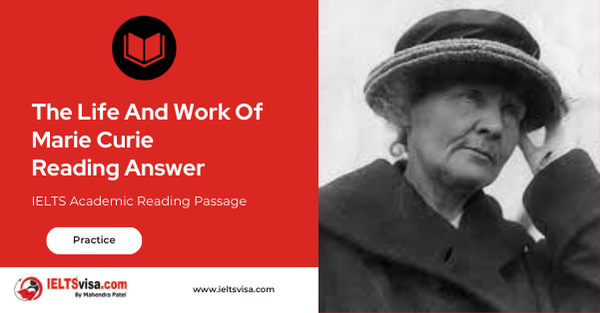Changing Our Understanding Of Health Reading Answer
IELTS Academic Reading Passage
A
The concept of health holds different meanings for different people and groups. These meanings of health have also changed overtime. This change is no more evident than in Western society today, when notions of health and health promotion are being challenged and expanded in new ways.
B
For much of recent Western history, health has been viewed in the physical sense only. That is, good health has been connected to the smooth mechanical operation of the body, while ill health has been attributed to a breakdown in this machine. Health in this sense has been defined as the absence of disease or illness and is seen in medical terms. According to this view, creating health for people means providing medical care to treat or prevent disease and illness. During this period, there was an emphasis on providing clean water, improved sanitation and housing.
C
In the late 1940s the World Health Organisation challenged this physically and medically oriented view of health. They stated that ‘health is a complete state of physical, mental and social well-being and is not merely the absence of disease’ (WHO, 1946). Health and the person were seen more holistically (mind/body/spirit) and not just in physical terms.
D
The 1970s was a time of focusing on the prevention of disease and illness by emphasising the importance of the lifestyle and behaviour of the individual. Specific behaviours which were seen to increase risk of disease, such as smoking, lack of fitness and unhealthy eating habits, were targeted. Creating health meant providing not only medical health care, but health promotion programs and policies which would help people maintain healthy behaviours and lifestyles. While this individualistic healthy lifestyles approach to health worked for some (the wealthy members of society), people experiencing poverty, unemployment, underemployment or little control over the conditions of their daily lives benefited little from this approach. This was largely because both the healthy lifestyles approach and the medical approach to health largely ignored the social and environmental conditions affecting the health of people.
E
During 1980s and 1990s there has been a growing swing away from seeing lifestyle risks as the root cause of poor health. While lifestyle factors still remain important, health is being viewed also in terms of the social, economic and environmental contexts in which people live. This broad approach to health is called the socio-ecological view of health. The broad socio-ecological view of health was endorsed at the first International Conference of Health Promotion held in 1986, Ottawa, Canada, where people from 38 countries agreed and declared that: The fundamental conditions and resources for health are peace, shelter, education, food, a viable income, a stable eco-system, sustainable resources, social justice and equity. Improvement in health requires a secure foundation in these basic requirements. (WHO, 1986). It is clear from this statement that the creation of health is about much more than encouraging healthy individual behaviours and lifestyles and providing appropriate medical care. Therefore, the creation of health must include addressing issues such as poverty, pollution, urbanisation, natural resource depletion, social alienation and poor working conditions. The social, economic and environmental contexts which contribute to the creation of health do not operate separately or independently of each other. Rather, they are interacting and interdependent, and it is the complex interrelationships between them which determine the conditions that promote health. A broad socio-ecological view of health suggests that the promotion of health must include a strong social, economic and environmental focus.
F
At the Ottawa Conference in 1986, a charter was developed which outlined new directions for health promotion based on the socio-ecological view of health. This charter, known as the Ottawa Charter for Health Promotion, remains as the backbone of health action today. In exploring the scope of health promotion it states that:
Good health is a major resource for social, economic and personal development and an important dimension of quality of life. Political, economic, social, cultural, environmental, behavioural and biological factors can all favour health or be harmful to it. (WHO, 1986)
The Ottawa Charter brings practical meaning and action to this broad notion of health promotion. It presents fundamental strategies and approaches in achieving health for all. The overall philosophy of health promotion which guides these fundamental strategies and approaches is one of ‘enabling people to increase control over and to improve their health’ (WHO, 1986).
Questions 1-5
The reading passage has six paragraphs A-F from the list of headings below
Choose the most suitable headings for paragraphs B-F from the list of headings below. Write the appropriate numbers (i-ix) in boxes 1-5 on your answer sheet.
NB There are more headings than paragraphs, so you will not use them all.
LIST OF HEADING
i. Ottawa International Conference on Health Promotion
ii. Holistic approach to health
iii. The primary importance of environmental factors
iv. Healthy lifestyles approach to health
v.Changes in concepts of health in Western society
vi. Prevention of diseases and illness
vii. Ottawa Charter for Health Promotion
viii. Definition of health in medical terms
ix. Socio-ecological view of health
| Example | Answer |
| Paragraph A | v |
1. Paragraph B
2. Paragraph C
3. Paragraph D
4. Paragraph E
5. Paragraph F
Questions 6-9
Using NO MORE THAN THREE WORDS from the passage, answer the following questions
Write your answers in boxes 6-9 on your answer sheet.
6. In which year did the World Health Organisation define health in terms of mental, physical and social well-being? 6…………………
7 .Which members of society benefited most from the healthy lifestyles approach to health? 7…………………
8. Name the three broad areas which relate to people’s health, according to the socio- ecological view of health. 8…………………
9. During which decade were lifestyle risks seen as the major contributors to poor health? 9…………………
Questions 10-14
Do the following statements agree with the information in the Reading Passage? In boxes 10-14 on your answer sheet write
YES if the statement agrees with the information
NO if the statement contradicts the information
NOT GIVEN if there is no information on this in the passsage
10.Doctors have been instrumental in improving living standards in Western society.
11.The approach to health during the 1970s included the introduction of health awareness programs.
12. The socio-ecological view of health recognises that lifestyle habits and the provision of adequate health care are critical factors governing health.
13. The principles of the Ottawa Charter are considered to be out of date in the 1990s.
14. In recent years a number of additional countries have subscribed to the Ottawa Charter.

Solution:Changing Our Understanding Of Health Reading Answer
| 1. viii | 8. social, economic, environmental |
| 2. ii | 9. (the) 1970s |
| 3. iv | 10. NOT GIVEN |
| 4. ix | 11. YES |
| 5. vii | 12. NO |
| 6. 1946 | 13. NO |
| 7. (the) wealthy (members) (of) (society) | 14. NOT GIVEN |
Review and Practice
- Regularly practice with IELTS reading samples and time yourself to get used to the pressure of the exam.
- Review your mistakes to understand where you went wrong and how to avoid similar errors in the future.
Our Books
Master IELTS Speaking Part 1
IELTS Writing Task 1 Book
IELTS Writing Task 2 Book
Changing Our Understanding Of Health Reading Answer Explanation
Comin Soon
Practice IELTS Other Modules
IELTS Listening
The IELTS Listening test assesses how well you can understand spoken English in various contexts. It lasts about 30 minutes and is divided into four sections with a total of 40 questions. The listening tasks become increasingly difficult as the test progresses.
IELTS Academic Reading
The IELTS Academic Reading section assesses your ability to understand and interpret a variety of texts in academic settings. It is designed to evaluate a range of reading skills, including skimming for gist, reading for main ideas, reading for detail, understanding inferences, and recognizing a writer's opinions and arguments.
IELTS Speaking
The IELTS Speaking test assesses your ability to communicate in English on everyday topics. It lasts 11-14 minutes and consists of three parts: introduction, cue card, and a discussion based on the cue card topic.
IELTS General Reading
IELTS General Reading tests your ability to understand and interpret various types of texts. Here are some key areas and types of content you can expect to encounter in the reading section, along with tips for effective preparation.
IELTS Academic Writing Task 1
In IELTS Academic Writing Task 1, you are presented with a visual representation of information, such as graphs, charts, tables, or diagrams, and you are required to summarize, compare, or explain the data in your own words.
IELTS General Writing Task 1
In IELTS General Writing Task 1, you are required to write a letter based on a given situation. The letter can be formal, semi-formal, or informal, depending on the prompt. Here’s a breakdown of the key components to include in your letter
IELTS Academic Writing Task 2
In IELTS Academic Writing Task 2, you are required to write an essay in response to a question or topic. Here’s a guide to help you understand the essential elements of this task
IELTS Exam Tips
To succeed in the IELTS exam, practice regularly, familiarize yourself with the test format, improve your vocabulary, develop time management skills, and take mock tests to build confidence.
Grammer for IELTS
Grammar is the foundation of effective communication in English. Understanding tense usage, subject-verb agreement, and sentence structure enhances clarity and coherence in writing and speaking.
Vocabulary for IELTS
Vocabulary plays a crucial role in the IELTS (International English Language Testing System) exam, especially in the Speaking and Writing sections. Here’s an overview of why vocabulary is important and how it impacts your performance
RECENT IELTS SAMPLES QUESTIONS AND ANSWERS
The Life And work Of Marie Curie Reading Answer
Marie Curie is probably the most famous woman scientist who has ever lived. Born Maria...
Becoming An Expert Reading Answer
A Expertise is commitment coupled with creativity. Specifically, it is the commitment of...
STUDY CENTRE COURSES Reading Answer
SELF-STUDY TIPS AHowever difficult you find it to arrange your time, it will pay off in the...
The Extrinct Grass In Britain Reading Answer
A The British grass interrupted brome was said to be extinct, just like the Dodo. Called...
Morse Code Reading Answer
A. A new satellite-based system is being implemented to replace Morse code for sending...
Magnetic Therapy Reading Answer
AMagnetic therapy, which is a $5-billion market worldwide, is a form of alternative medicine...













